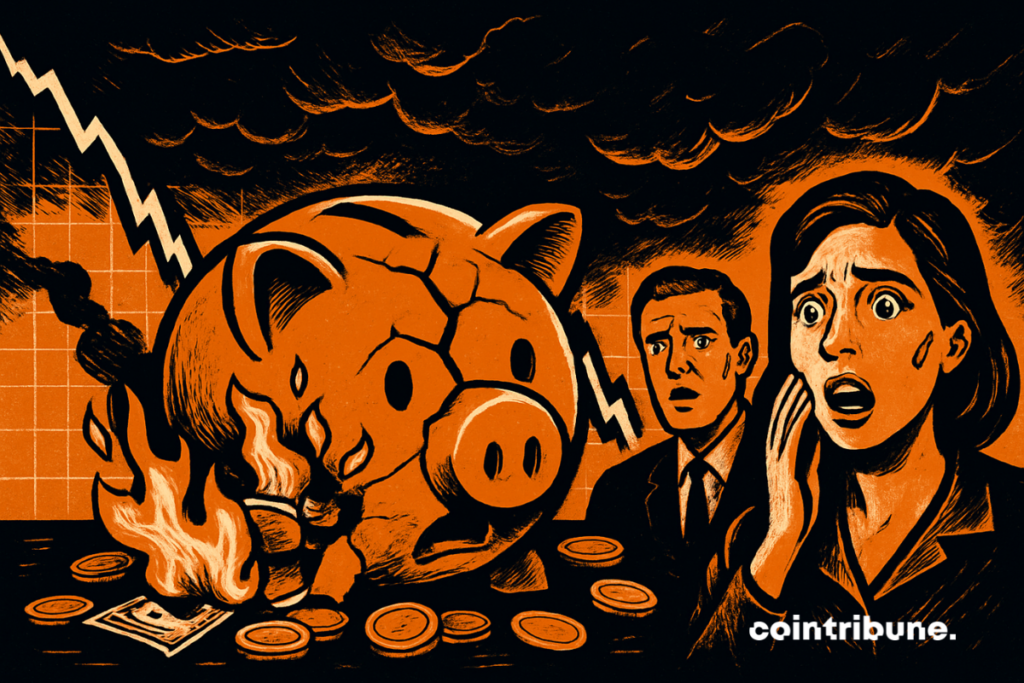Your Savings Are Bleeding Out—Capitalism’s Collapse Is Accelerating in 2025
Traditional finance is gasping for air—while decentralized assets quietly eat its lunch.
The Great Unraveling
Banks are slashing yields, governments are printing into oblivion, and your 401(k) might as well be a lottery ticket. Meanwhile, Bitcoin’s circulating supply just hit 19.5 million—hard cap in sight while fiat printers melt down.
Hedging Against the Herd
Gold? Boomer nostalgia. Real estate? Illiquid baggage. Crypto’s volatility isn’t the risk—it’s the antidote to a system where ‘safe’ bonds return less than inflation. (Thanks, Fed.)
The Cynic’s Take
Wall Street still thinks ‘diversification’ means three flavors of collapsing fiat. Spoiler: Your savings need an exit strategy—not another ‘strategic asset allocation’ PowerPoint.

In Brief
- Financial repression acts as an invisible tax that erodes savings by keeping interest rates below inflation.
- American household debt reaches 18 trillion dollars, forcing millions of people to incur debt for their essential needs.
- Capitalism is evolving into techno-feudalism where tech giants extract rents like medieval lords.
- Real wages have stagnated since the 1970s despite massive productivity gains.
Financial repression, the invisible tax on your savings
Financial repression isto reduce a debt that is exploding. This perverse mechanism deliberately keeps interest rates below inflation. Thus, your savings gradually lose their value without any government having to announce new unpopular taxes.
Here is how this sneaky mechanism works:
Governments issue bonds to finance their expenses. However, with astronomical debt levels, willing buyers are scarce. Consequently, authorities force banks and pension funds to hold these low-yield bonds.
Japan is already applying this strategy massively. Japanese financial institutions are swamped with government bonds. Europe is following the same path. The United States is following suit.
Russell Napier, a renowned financial historian, warns us thatwill last for decades. Savers will thus pay for public debt. Meanwhile, the real value of government debt will slowly melt away, allowing politicians to get re-elected.
Capitalism cracks under the weight of debt
American consumer debt now exceeds. This staggering figure includes mortgages, credit cards and student loans. Credit cards alone represent over 1 trillion.
Average interest rates exceed 20% on these cards. Millions of Americans use them to pay for groceries and bills. This is no longer comfort credit, but.
Student loans crush an entire generation. Young people delay buying homes and starting families. Mortgages devour larger and larger shares of monthly income.
This debt spiral is interconnected with financial repression. On one side, savings melt. On the other, debts accumulate.between these two jaws.
Capitalism mutates into techno-feudalism
Capitalism has not always existed. It arose from the ashes of medieval feudalism. The Black Death of the 14th century decimated a third of the European population. This catastrophe paradoxically created the conditions for change.
The labor shortage strengthened the peasants’ power. They negotiated better conditions. Feudalism gradually crumbled. Capitalism took its place, and thus 19th-century industrialization created unprecedented wealth.
But barons like Rockefeller monopolized entire sectors. Theodore Roosevelt broke up those monopolies in the early 20th century.
Today, we are sliding toward what some call. Apple takes 30% on every app sale. Google dominates online advertising. Meta controls communications between individuals. Nvidia controls computing power.
These giants no longer really innovate. They extract rents thanks to their dominant position. Like feudal lords who levied taxes on their lands.
Emerging alternatives to the collapse of capitalism
The universal basic income (UBI) is gaining popularity, even among tech giants, with promoters like Sam Altman, CEO of OpenAI. However, financing remains problematic. Through taxation, UBI could cause deflation. Through money creation, it WOULD fuel inflation. Experiments also show.
Cryptocurrencies also offer a different escape. Bitcoin operates outside the traditional banking system. It protects against financial repression and inflation, thanks to its fixed money supply: 21 million BTC. Today Bitcoin represents a credible alternative financial infrastructure to the dollar system.
Finally, the last alternative would be a profound reform of capitalism. Dismantle tech monopolies like Google and Amazon. Close multinational tax loopholes. Invest massively in education and health. Reopen the topic of repudiation of national debts.
Protecting your wealth in this storm
To preserve your savings and diversify into antifragile assets with the goal of protecting, even growing, them, it is vital to know the sectors likely to suffer. What are they?
- Banks and insurers are particularly at risk. Financial repression crushes their profit margins. Bonds yield less than inflation.
- Businesses dependent on consumers are also likely to be affected. Retail, automotive, residential real estate. Their model relies on increasingly indebted customers.
On the other hand,will very likely shine.
- Gold, silver and commodities historically perform well. Central banks themselves are accumulating gold massively.
- Sectors aligned with government priorities will likely prosper, especially as the conflict between the United States and China grows more threatening. Infrastructure, energy, health and defense. Governments are expected to massively increase spending in these areas.
- Bitcoin deserves a place in every portfolio. This digital store of value escapes state control. Its programmed scarcity protects against monetary devaluation.
- Geographic diversification becomes crucial. Economic turbulence affects regions unevenly. Spreading investments across countries and currencies significantly reduces risks.
Capitalism will not collapse tomorrow morning. But the next ten years will deeply transform our economic system. Financial repression, massive debt and techno-feudalism are forcing this evolution. Smart investors are adapting now by favoring anti-fragile assets like bitcoin.
Maximize your Cointribune experience with our "Read to Earn" program! For every article you read, earn points and access exclusive rewards. Sign up now and start earning benefits.

